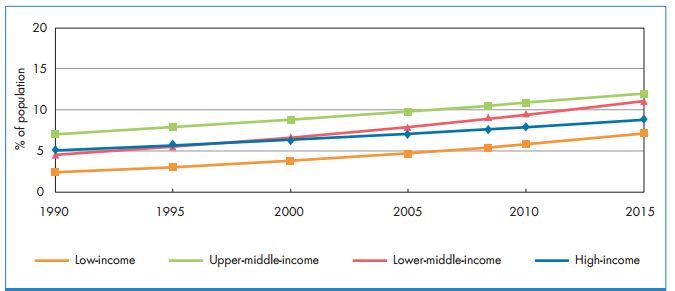5 facts about global obesity

News that Americans are cutting their calories has reignited hope that there are ways of tackling the scourge of obesity. Someone is obese if they have a body mass index (which is weight in kilos divided by height in meters squared) of 30 or more, according to the World Health Organisation. A BMI of 25 or more is considered overweight. According to these measures, worldwide obesity has more than doubled since 1980, meaning that last year there were more than 1.9 billion overweight adults (39% of the adult population), 600 million of whom were obese (13%).
Behind those headlines here are five interesting obesity trends.
1. Americans are getting thinner
Obesity takes hold young and is difficult to shake off. Children who are overweight at 3-5 years old are five times more likely than average to be overweight as adults. That’s why the results of a major US study last year, which found that obesity among 2-5 year olds had fallen by more than 40%, were such a pleasant surprise to the health profession.
Scientists remain cautious about calling a turning point, but the changes correlate with sharp falls in the consumption of high-calorie foods. University of Carolina researchers found that children’s consumption of sugar-sweetened beverages fell 79% between 2004 and 2012.
2. Obesity is everywhere
Once thought of as a rich nation’s disease, with Americans the most visible sufferers, international comparisons paint a more nuanced picture of the condition. Data collated by the World Health Organisation shows that in 2014 there were high concentrations of obesity in every region of the world.
 Click here for an interactive version of the map
Click here for an interactive version of the map
3. The US is not the most overweight nation
Among territories surveyed by WHO, Pacific islands and nations in the Middle East and North Africa dominate the table of most overweight populations. The US comes in at 22nd; Turkey is the European nation worst affected at 24th; Mexico is 27th; and Australia 28th.
1. Cook Islands
2. Palau
3. Qatar
4. Nauru
5. Marshall Islands
6. Kuwait
7. Niue
8. Tonga
9. Samoa
10. United Arab Emirates
11. Tuvalu
12. Kiribati
13. Bahrain
14. Fiji
15. Saudi Arabia
16. Bahamas
17. Micronesia
18. Libya
19. Lebanon
20. Vanuatu
4. We’ve been gaining weight for a long time
WHO data shows that obesity rates have been on an uptrend for decades, a trend that spans all income groups. This is why health experts believe it is too early to be talking about “peak obesity”, despite news of a decline from the US.
This chart shows overweight infants and young children by World Bank income group:
5. Women are more affected than men
An interplay of social, cultural and biological factors means that in almost all countries women are more likely to be obese than men. An analysis by McKinsey & Company notes the enormous implications of this phenomenon, including health, life expectancy, education and employment.
Have you read?
Food: how much does the world need?
Why obesity threatens the global economy
Can agriculture improve our health?
Author: Mark Jones is Commissioning Editor for the World Economic Forum
Image: People take an aerobics class in Cartago, near San Jose July 10, 2012. REUTERS/Juan Carlos Ulate
Don't miss any update on this topic
Create a free account and access your personalized content collection with our latest publications and analyses.
License and Republishing
World Economic Forum articles may be republished in accordance with the Creative Commons Attribution-NonCommercial-NoDerivatives 4.0 International Public License, and in accordance with our Terms of Use.
The views expressed in this article are those of the author alone and not the World Economic Forum.
Stay up to date:
Future of Global Health and Healthcare
Forum Stories newsletter
Bringing you weekly curated insights and analysis on the global issues that matter.








